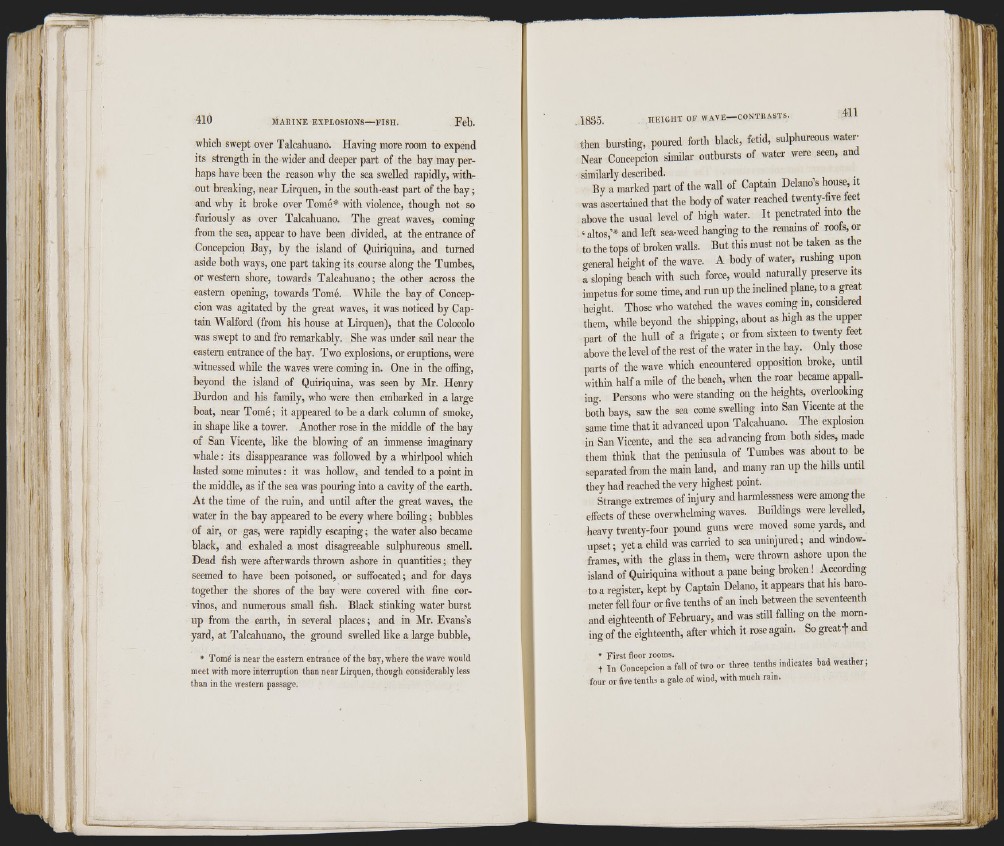
Feb.
which swept over Talcahuano. Having more room to expend
its strength in the wider and deeper part of the bay may perhaps
have been the reason why the sea swelled rapidly, without
breaking, near Lirquen, in the south-east part of the bay;
and why it broke over Tomé* with violence, though not so
furiously as over Talcahuano. The great waves, coming
from the sea, appear to have been divided, at the entrance of
Concepcion Bay, by the island of Quiriquina, and turned
aside both ways, one part taking its course along the Tumbes,
or western shore, towards Talcahuano; the other across the
eastern opening, towards Tomé. While the bay of Concepcion
was agitated by the great waves, it was noticed by Captain
Walford (from his house at Lirquen), that the Colocolo
was swept to and fro remarkably. She was under sail near the
eastern entrance of the bay. Two explosions, or eruptions, were
witnessed while the waves were coming in. One in the offing,
beyond the island of Quiriquina, was seen by Mr. Henry
Burdon and his family, who were then embarked in a large
boat, near Tomé; it appeared to be a dark column of smoke,
in shape like a tower. Another rose in the middle of the bay
of San Vicente, like the blowing of an immense imaginary
whale: its disappearance was followed by a whirlpool which
lasted some minutes : it was hollow, and tended to a point in
the middle, as if the sea was pouring into a cavity of the earth.
At the time of the ruin, and until after the great waves, the
water in the bay appeared to be every where boiling; hubbies
of air, or gas, were rapidly escaping; the water also became
black, and exhaled a most disagreeable sulphureous smell.
Dead fish were afterwards thrown ashore in quantities; they
seemed to have been poisoned, or suffocated; and for days
together the shores of the bay were covered with fine corvinos,
and numerous small fish. Black stinking water burst
up from the earth, in several places; and in Mr. Evans’s
yard, at Talcahuano, the ground swelled like a large bubble,
• Tomé is near the eastern entrance of the bay, where the wave would
meet with more interruption than near Lirquen, though considerably less
than in the western passage.
then bursting, poured forth black, fetid, sulphureous water
Near Concepcion similar outbursts of water were seen, and
similarly described. „ , , ,
By a marked part of the wall of Captain Delano s house, it
was ascertained that the body of water reached twenty-five feet
above the usual level of high water. I t penetrated into the
‘ altos,’* and left sea-weed hanging to the remains of roofs, or
to the tops of broken walls. But this must not be taken as the
o-eneral height of the wave. A body of water, rushing upon
a sloping beach with such force, would naturally preserve its
impetus for some time, and run up the incUned plane, to a great
height. Those who watched the waves coming in, considered
them, while beyond the shipping, ahout as high as the upper
part of the hull of a frigate; or from sixteen to twenty feet
above the level of the rest of the water in the bay. Only those
parts of the wave which encountered opposition broke, until
within half a mile of the beach, when the roar became appalling.
Persons who were standing on the heights, overlooking
bo”h bays, saw the sea come swelling into San Vicente at the
same time that it advanced upon Talcahuano. The explosion
in San Vicente, and the sea advancing from both sides, made
them think that the peninsula of Tumbes was about to be
.separated from the main land, and many ran up the hills until
they had reached the very highest point.
Strange extremes of injury and harmlessness were among the
effects of these overwhelming waves. Buildings were levelled,
heavy twenty-four pound guns were moved some yards, and
upset; yet a child was carried to sea uninjured; and window-
frames, with the glass in them, were thrown ashore upon the
island of Quiriquina without a pane being broken ! According
to a register, kept by Captain Delano, it appears that Ins barometer
fell four or five tenths of an inch between the seventeenth
and eighteenth of February, and was still falling on the morning
of the eighteenth, after which it rose again. So greatf and
• First floor rooms.
t In Concepcion a fall of two or three tenths indicates bad weather;
four or five tenths a gale of wind, with much rain.